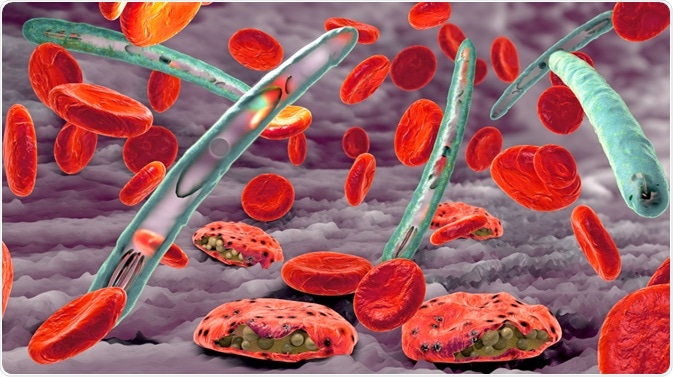Cerebral malaria is a serious neurological complication of severe malaria that affects about 1% of children under the age of 5 who have been infected with Plasmodium falciparum.

Malaria. Image Credit: Christoph Burgstedt/Shutterstock.com
An overview of malaria
The Plasmodium genus of unicellular protozoan parasites are responsible for causing the disease malaria in humans, the most deadly of which includes Plasmodium falciparum. Each year, malaria affects about 219 million people, with about 500,000 people dying each year from this disease. It is estimated that about 93% of the people who die from malaria reside in sub-Saharan Africa, many of whom are under the age of 5.
Humans typically acquire malaria after being bitten by an infected female mosquito of the Anopheles genus. In addition, blood-borne transmission through the transfusion of blood products, transplantation, or needle-sharing, as well as congenital transmission of malaria can also occur. Once infected, malaria can either evolve into simple or severe forms, the latter of which is a less frequent presentation of this disease.
Severity of malaria
The severity of malaria is often dependent upon the immune status of the host, as well as the area in which malaria has been acquired. For example, areas that have a stable endemic of P. falciparum will often find that severe malaria commonly occurs in children up to 5 years of age, whereas older children and adults will experience less severe forms of the infection due to partial immunity. Comparatively, areas with lower endemic rates will have a less defined age distribution of severe malaria.
Initially, malaria will cause nonspecific flu-like symptoms including malaise, anorexia, lassitude, dizziness, headache, body aches, nausea, vomiting, and chills. The progression of malaria into more severe symptoms will often depend upon the infecting parasite. For example, infection by P. vivax and P. ovale will typically cause a classical malaria paroxysm that includes three symptom stages, beginning with a cold stage, followed by a hot stage, and ending with a sweating stage.
Most of the severe complications of malaria will occur in individuals who have been infected with P. falciparum. Severe malaria is often defined as the presence of Plasmodium in peripheral blood. Some of the complications of severe malaria can involve the central nervous system, which is otherwise referred to as cerebral malaria, the pulmonary system, renal system, and/or the hematopoietic system. The progression to these complications is often rapid and can lead to death in many cases.
What is cerebral malaria?
According to the World Health Organization (WHO), cerebral malaria is defined as a severe form of P. falciparum malaria that causes cerebral manifestations. Typically, patients with cerebral malaria will experience a coma that persists for more than 30 minutes after a seizure occurs. While this may be true, patients with any degree of altered consciousness and other signs of cerebral dysfunction should be treated for severe malaria.
It is estimated that about 1% of children who have been infected with P. falciparum will develop cerebral malaria, with the incidence in adults being highly rare. However, low transmission areas will often find that cerebral malaria occurs more commonly in older children and adults. Studies have shown that younger children may be partly protected from cerebral malaria as a result of a process known as premunition, during which maternal immunity is transferred to the child in utero.
Symptoms of cerebral malaria
As previously mentioned, coma is a hallmark symptom of cerebral malaria; however, the onset of this neurological complication can vary from occurring suddenly or gradually. When coma develops gradually, patients will often initially present with drowsiness, which should always be considered a worrying symptom, confusion, disorientation, delirium, or agitation. Addition observations that might be seen with cerebral malaria include:
- Open-eyed but non-seeing
- Disconjugate gaze
- Nystagmus
- Sustained ocular deviation, usually upward or lateral
- Abnormal posturing
- Decerebrate rigidity
- Decorticate rigidity
- Opisthotonos
- Neck rigidity
- Seizures
- Electroencephalographic abnormalities
Some other symptoms that are often common manifestations of cerebral malaria include fixed jaw closure and tooth grinding. Cerebral malaria is also often accompanied by non-neurological symptoms including enlargement of the liver and spleen, jaundice, pulmonary edema, renal dysfunction, pallor, hypoglycemia, bleeding, hypotension, and severe anemia.
Another notable complication of cerebral malaria that can be used to differentiate this condition from other encephalopathies that often occur in malaria-endemic areas includes malignant retinopathy. Malignant retinopathy in malaria arises due to the cerebral sequestration of parasites in the brain and can be diagnosed based on the presence of four major symptoms, which include:
- Retinal whitening
- Vessel changes
- Retinal hemorrhages
- papilledema
Treatment for cerebral malaria
Antimalarial treatment can be in the form of two classes of drugs, which include derivatives of artemisinin and those generated from cinconcha alkaloids. Whereas derivatives of artemisinin include artesunate and artemether, those that originate from cinconcha alkaloids include quinine and quinidine.
The ability of severe malaria to affect multiple organ systems, therefore, warrants additional medical interventions to treat these complications. For example, patients who experience a coma should, when necessary, be intubated and supported through mechanical ventilation. Since seizures are also a common complication of cerebral malaria, their medical management through the use of anticonvulsants is also crucial.
Prognosis
If left untreated, cerebral malaria is almost always fatal; therefore, aggressive treatment immediately should be initiated immediately after a diagnosis of cerebral malaria is made. Even after treatment is initiated, cerebral malaria still has a mortality rate of 20% and 15% in adults and children, respectively.
Fortunately, many of the patients who do survive cerebral malaria will typically experience a rapid recovery and a complete reversal of their neurological symptoms. However, some neurological symptoms may persist after recovery from cerebral malaria for several days or several weeks after their onset. These manifestations might include psychosis, cranial nerve lesions, extrapyramidal tremor, ataxia, polyneuropathy, and seizures.
References:
Further Reading
Last Updated: Aug 17, 2021